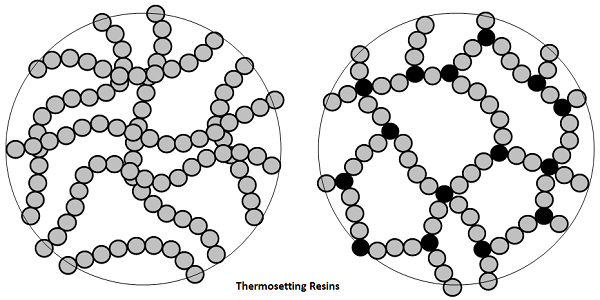Thermosetting resins

Thermosetting resins, polymers or plastic, often called a thermoset, are polymers that are irreversibly hardened by curing from a soft solid or viscous liquid prepolymer or resin. Curing is induced by heat or suitable radiation and may be promoted by high pressure, or mixing with a catalyst. Heat is not necessarily to be applied externally. It is often generated by the reaction of the resin with a curing agent (catalyst, hardener). Curing results in chemical reactions that create extensive cross-linking between polymer chains to produce an infusible and insoluble polymer network.
The starting material for making thermosets is usually malleable or liquid prior to curing, and is often designed to be molded into the final shape. It may also be used as an adhesive. Once hardened, a thermoset cannot be melted for reshaping, in contrast to thermoplastic polymers which are commonly produced and distributed in the form of pellets, and shaped into the final product form by melting, pressing, or injection molding.
The common thermosetting resin include:
- Polyester Resin
- Vinyl Ester Resin
- Epoxy
- Phenolic
- Urethane
Properties of thermosetting resins:
Thermosetting plastics are generally stronger than thermoplastic materials due to the three-dimensional network of bonds (cross-linking), and are also better suited to high-temperature applications up to the decomposition temperature.
- Excellent resistance to solvents and corrosives
- Resistance to heat and high temperature
- Excellent finishing
- Fatigue strength
- Excellent adhesion
- Tailored elasticity
The thermosetting resin once catalyzed then it can not be reversed or reformed. Means once a thermoset composite is formed, it cannot be remolded or reshaped, because of this property, the recycling of thermoset composites is extremely difficult.
